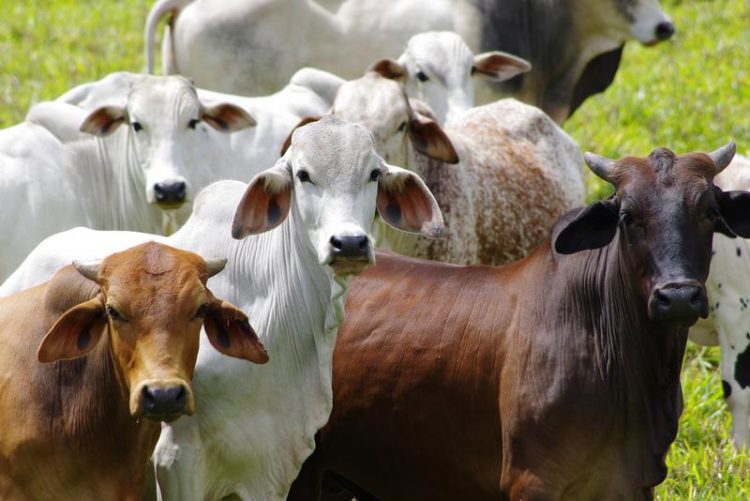Brazilian agricultural policy could cut global greenhouse gas emissions

Intensifying cattle production in Brazil could reduce greenhouse gas emissions. Credit: David Ozolin via Flickr, Creative Commons License
The study, published in the journal Proceedings of the National Academy of Sciences, showed that by subsidizing semi-intensive pasture-based cattle production or taxing conventional pastures Brazil may be able to deliver a substantial cut in global greenhouse gas emissions, even in the absence of a global agreement to prevent deforestation.
Brazil is the world's second largest producer of beef and the world's largest exporter of beef. Cattle pastures occupy one quarter of the land surface in Brazil, including as much as 80% of recently deforested land. Brazil has lost more forestland than any other country in the past 20 years. Worldwide, deforestation contributes to as much as 20% of human-caused greenhouse gas emissions.
“Climate policies are an investment for governments. One of the major concerns that governments have about making climate policies unilaterally is that the benefits will be canceled out by increased emissions in other countries,” says Tufts University researcher Avery Cohn, who led the study.
Previous studies of Brazilian agriculture have warned that policies to intensify cattle ranching could lower beef prices and increase beef consumption or raise beef prices and increase beef production. Either effect could drive more deforestation in other countries, canceling out any overall reduction in emissions.
“Our study shows that greenhouse gains from pasture intensification policies considerably exceed the losses. Brazil could act alone and still make a major dent in global greenhouse gas emissions,” says IIASA researcher Aline Mosnier, a co-author on the study, which Cohn started as a participant in IIASA’s Young Scientists Summer Program while completing his PhD at the University of California, Berkeley.
The two policies—subsidizing more intensive cattle ranching or taxing conventional pastures would both reduce deforestation in the Brazilian Amazon by about 50% between 2010 and 2030. This would lead to a 25% reduction in global greenhouse gas emissions from deforestation during that time. Combining the two policies could provide a revenue-neutral way for the Brazilian government to reduce greenhouse gas emissions.
The researchers expanded IIASA’s Global Biosphere Management Model (GLOBIOM) to examine the effects of the two policies both within and beyond Brazil’s borders. GLOBIOM is an economic model of global land use, which is being applied to questions of agriculture, deforestation, and REDD policies around the world.
Previous work by IIASA researchers has shown that more efficient livestock production methods could be an effective method to reduce greenhouse gas emissions worldwide, while improving food security. [http://www.iiasa.ac.at/web/home/about/news/20140225-PNAS.html].
The new study was carried out in collaboration with Tufts University, the Energy Biosciences Institute (EBI) at the University of California, Berkeley, the Commonwealth Scientific and Industrial Research Organization (CSIRO), IIASA’s Australian National Member Organization, and University of Natural Resources and Applied Life Sciences in (BOKU) in Vienna.
Reference
Cohn AS, Mosnier A, Havlik P, Valin, H, Herrerro M, Schmid E, O’Hare M, Obersteiner M. (2014). Cattle ranching intensification in Brazil can reduce global greenhouse gas emissions by sparing land from deforestation. Proceedings of the National Academy of Sciences. www.pnas.org/cgi/doi/10.1073/pnas.1307163111
For more information please contact:
Avery Cohn
Tufts University
Assistant Professor; the Fletcher School
Director; Program in Agriculture and Forests, Center for International Environment and Resource Policy
+1 (510) 410-3731
avery.cohn@tufts.edu
Aline Mosnier
Research Scholar
Ecosystems Services and Management
+43(0) 2236 807 567
mosnier@iiasa.ac.at
Katherine Leitzell
IIASA Press Office
Tel: +43 2236 807 316
Mob: +43 676 83 807 316
leitzell@iiasa.ac.at
About IIASA:
IIASA is an international scientific institute that conducts research into the critical issues of global environmental, economic, technological, and social change that we face in the twenty-first century. Our findings provide valuable options to policy makers to shape the future of our changing world. IIASA is independent and funded by scientific institutions in Africa, the Americas, Asia, Oceania, and Europe. www.iiasa.ac.at
Media Contact
All latest news from the category: Ecology, The Environment and Conservation
This complex theme deals primarily with interactions between organisms and the environmental factors that impact them, but to a greater extent between individual inanimate environmental factors.
innovations-report offers informative reports and articles on topics such as climate protection, landscape conservation, ecological systems, wildlife and nature parks and ecosystem efficiency and balance.
Newest articles

Innovative 3D printed scaffolds offer new hope for bone healing
Researchers at the Institute for Bioengineering of Catalonia have developed novel 3D printed PLA-CaP scaffolds that promote blood vessel formation, ensuring better healing and regeneration of bone tissue. Bone is…

The surprising role of gut infection in Alzheimer’s disease
ASU- and Banner Alzheimer’s Institute-led study implicates link between a common virus and the disease, which travels from the gut to the brain and may be a target for antiviral…

Molecular gardening: New enzymes discovered for protein modification pruning
How deubiquitinases USP53 and USP54 cleave long polyubiquitin chains and how the former is linked to liver disease in children. Deubiquitinases (DUBs) are enzymes used by cells to trim protein…



